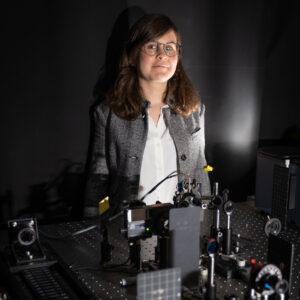Weichman Lab Awarded Prestigious DOE Grant
Marissa Weichman, assistant professor in the Department of Chemistry, has been awarded a grant for next-generation STEM leaders from the Department of Energy (DOE) Office of Science’s Early Career Research Program.
She is one of 83 early-career scientists across the country to receive the prestigious award, which carries funding of $150K each year for five years.
Weichman won for her proposal, “Polariton Reaction Dynamics: Exploiting Strong Light-Matter Interactions for New Chemistry,” under the Basic Energy Sciences program office. The awards, peer reviewed by scientific experts outside the DOE, were announced this week.

Assistant Professor of Chemistry Marissa Weichman, whose lab has received a prestigious grant from the DOE for investigations in polariton chemistry.
The funding is intended to bolster the nation’s scientific workforce by supporting exceptional researchers at the outset of their careers, when many scientists do their most formative work. Awardees hail from 47 universities and 13 National Labs in 29 states.
“This was huge news because our lab is still building. To get this kind of recognition this early is really amazing,” said Weichman, who joined the Department in 2020. “I have to give most of the credit to my group members who pushed so hard this past winter to get the preliminary results that made this a compelling proposal.”
Weichman is a physical chemist whose background in high-resolution spectroscopy enables exploration in the new and growing field of polariton chemistry.
The proposal for which she won the DOE grant will utilize ultrafast laser pulses to make precise measurements of how molecules undergo simple chemical reactions while experiencing extremely intense interactions with light.
The Weichman Lab aims to engineer these strong light-matter interactions by placing molecules inside an optical cavity, a device that traps and concentrates light between two reflective mirrors. Inside the optical cavity, a laser pulse will break apart a precursor molecule to start a chemical reaction that can be observed and measured as it occurs on timescales as fast as 100 femtoseconds.
“You can use an optical cavity to strengthen the interaction between light and matter to make more sensitive measurements of how molecules absorb light, as we do in cavity-enhanced spectroscopy. Polariton chemistry takes that to an extreme—where the strength of the interaction of the light and matter is so intense it actually changes the way the molecules behave and undergo chemistry,” said Weichman.
“It’s a relatively new field, in general. There have been a few experimental demonstrations in the literature that provide compelling evidence for new chemistry occurring inside optical cavities. But there are not that many experimental groups working here. There are a lot more theorists who have flocked to this arena, and because of that there’s a big gap in understanding. The theorists need much more and much cleaner data, so we’re trying to meet them halfway to say, okay, we’re going to study systems that are really interpretable.”
Building the Instrumentation
Over the past year, the Weichman Lab has focused on building spectroscopy instrumentation capable of carrying out its experiments in molecular dynamics. Weichman credits lab members Ashley Fidler and Liying Chen with seeing the arduous process through.
“We were so motivated to build the instrumentation and perform preliminary measurements because we are really excited for the potential of these experiments to provide insight into how polariton states modify chemistry and form the foundation of new avenues for synthesis and catalysis,” said Chen, who is just beginning his second year as a graduate student. “Having a background in ultrafast spectroscopy definitely helped me learn and contribute to the build more quickly.”
One additional Princeton faculty member was awarded a DOE early-career grant this week: Emily Davidson, assistant professor of Chemical and Biological Engineering, for her proposal on “Molecular and Network Design of Liquid Crystal Elastomer Elastocalorics.”
Since its inception in 2010, the DOE’s Early Career Research Program has made 785 awards, with 508 awards to university researchers and 277 awards to researchers at national labs.
“Supporting America’s scientists and researchers early in their careers will ensure the U.S. remains at the forefront of scientific discovery and develops the solutions to our most pressing challenges,” said U.S. Secretary of Energy Jennifer M. Granholm in a DOE press release.
“The funding announced today will allow the recipients the freedom to find the answers to some of the most complex questions as they establish themselves as experts in their fields.”
Information about the 83 awardees and their research projects is available on the DOE Early Career Research Program webpage.
